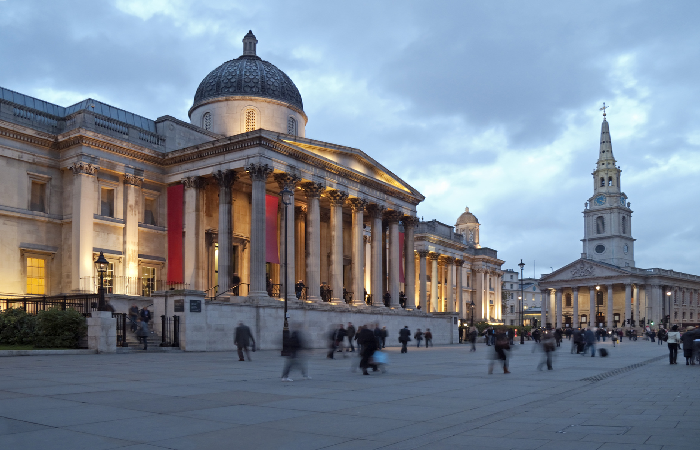
A preliminary hearing regarding an employment status case against The National Gallery will be heard today (16 July 2018), at The London Central Employment Tribunal.
The case concerns 27 artists and art lecturers, who are arguing that they should be recognised as either employees or workers.
The claimants contend that they were dismissed by the gallery without recognition of history of employment in October 2017. While employed, they state that they were paid through National Gallery payroll, taxed at source and required to attend staff training and receive formal reviews.
A crowdfunding appeal has been launched to cover the legal costs of the full hearing, which will take place over an eight-day period, beginning 26 November 2018.
James Heard, a claimant who worked for The National Gallery for 45 years, said: “We are standing up for fair treatment for staff in the arts, and to protect the teaching expertise at the heart of our museums. Our national galleries are something the UK is extremely proud of and it is vital that the educators who hold the collective knowledge of these places are properly protected.”
Jo Lewis, a claimant who worked for the National Gallery for 16 years, said: “We are asking for our longstanding contribution to the National Gallery to be recognised and valued. We are asserting our rights as employees, and at a minimum ‘workers’. Until our recent unfair dismissal we worked regularly for decades, with commitment to the Gallery’s learning programmes.”
Marie-Therese Ross, a claimant who worked for the National Gallery for 22 years said: “We have been educators at the gallery for anywhere between [10] and over 40 years. We love the gallery and recognise its importance in artistic and cultural education.
“However, despite our attempts to raise our concerns with the Gallery, we as a group have not been given the rights to which we believe we are entitled. For example, we have been given no holiday or holiday pay and have been subjected to unfair dismissal, failure to consult and discrimination on the grounds of age, gender and trade union membership.”
Marie van der Zyl, partner at Gordon Dadds, the firm representing the claimants, said: “Individuals working in the arts are in need of certainty surrounding their employment rights and it’s essential to ensure they are categorised correctly.
“The legal basis for this claim is similar to the recent status cases in the private sector – notable examples being the cases against Uber and Deliveroo.
“The legal question for the [employment tribunal] is one of the status of the individuals: employee, worker or self-employed. The rights to which the individuals are entitled, such as holiday pay, sick pay and the right not to be unfairly dismissed, will flow from that decision.”
A spokesperson from The National Gallery said: “The gallery has been issued with a number of different claims from a number of freelance workers who have been providing a range of different services for the gallery (and other museums and galleries across London) on an ad hoc basis for a number of years.
“It is our understanding that the claims have arisen out of the gallery’s wish to change from offering ad hoc work to offering more secure employment, with additional pension and worker benefits. This change reflects the gallery’s strategy to develop our programmes to increasingly reach new audiences and make the most of digital technology to widen our engagement.
“The entire group were consulted for their views together and individually over the change for a period of three months between October 2017 and January 2018. These jobs were offered to all of our existing freelance service providers last year. We still have vacancies which are available, although unfortunately not all of the group have expressed an interest in these.
“At the present time, it is our understanding that the tribunal is actually scheduled for the end of the year. The session on Monday 16 July is an administrative session to discuss process.
“The Gallery is not yet in receipt of the details of each complaint, but believes that [it has] acted both lawfully and fairly in changing [its] service provision to one of secure employment.”